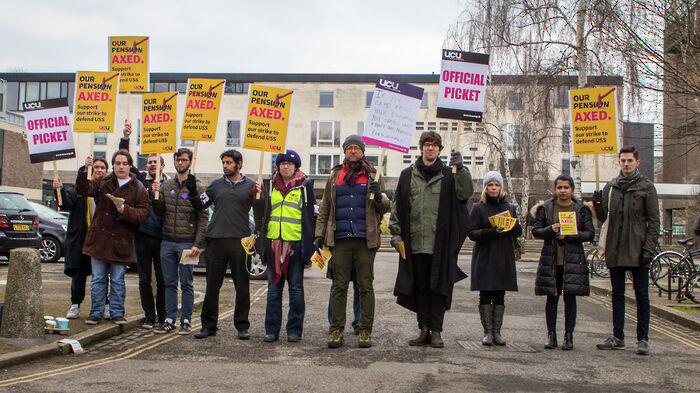Toope cedes further ground on pensions dispute amid growing criticism
The vice-chancellor announced he would call on the University to take greater risk and costs for pension schemes as alumni and academics pushed for change

University of Cambridge vice-chancellor Stephen Toope announced today that he would ask the University’s governing body to accept greater risk and cost in the short-term with regards to the ongoing pensions dispute, following vocal criticism from university staff and alumni.
In a letter to students and staff tonight, Cambridge vice-chancellor Stephen Toope said: “I will be asking the Council to accept greater risk and cost in the short-term as a bridge to a sustainable long-term solution in the interests of the sector, the University and individual members of USS”.
Toope’s letter suggests a reversal in the University’s position of wanting ‘less risk to be taken’ in the Universities Superannuation Scheme to reduce employers’ exposure, a position it indicated to Universities UK in its 2017 survey. Speaking to Varsity tonight, the University did not offer further clarification on whether it is reconsidering its preferred level of risk to the USS, a scheme currently operating with an estimated deficit of £6.1bn.
In an email sent to Cambridge UCU members, branch secretary Waseem Yaqoob, called the announcement “a major victory that testifies to the power of our efforts on strike, through Regent House and in the colleges” and a major concession “necessary to buy time for a new valuation of USS”.
He added, however, that: “we need much firmer commitments to staff, and to changing the UUK line. Where is the explicit support for staff? Why has our VC not disavowed the September consultation, as more than 30 others (now including Oxford) have?
“Why no mention of the retention of defined benefit, something that has been a core staff demand from staff since the beginning of this dispute? When will staff get to see these ‘ideas for both short and long-term solutions for this crisis’? Will consultation once again be left by the wayside?”
Speaking to Varsity, Yaqoob said: “The VC’s statement is a step in the right direction, and testifies to the power of our strike and of the wonderful support that students have given us. The call for Council to take on greater risks and costs in the short-term is a necessary measure until we have a new and more sound valuation of USS. That the university has finally accepted the need for an independent valuation of our pension scheme shows that we have won the intellectual argument.”
However, he added: “At the same time, once again our VC offers little concrete; much less than other VCs”, and, “There is little explicit support for staff, and remarkably there is still no commitment to keeping a Defined Benefit pension scheme”, which he labelled staff’s main demand.
More than 600 alumni of the University of Cambridge have signed an open letter to the vice-chancellor, demanding that he “stand up for staff” and “promote a future for the UK’s higher education sector that values collaboration over competition, and education over profits.”
The letter also criticises the University for “the role [it] has been playing nationally and its treatment of staff”. Commenting that they were “ashamed of Cambridge’s decisive part in the “continued marketisation of higher education in the UK”, they added that the University “has a responsibility, as well as the influence, to help resolve it”.
Although the letter thanks Toope for his “recent statement in favour of negotiation and compromise”, it calls for the University to “push for a solution which protects the staff of the whole USS membership”.
100 senior academics from both the Sciences and Humanities also gathered outside Senate House today calling on Toope to follow the lead of Oxford vice-chancellor Louise Richardson, in reversing the University’s position on USS risk to employers. Richardson recommended today that the Council “reverse its response to the UUK survey”, in line with an unofficial resolution passed by Oxford’s governing body yesterday.
In determining proposed changes to university staff pensions, Universities UK issued a survey to UK higher education institutions last September on whether they believed that the level of risk proposed in the USS valuation was appropriate. UUK later stated that feedback from the survey informed their recommendation of a ‘more moderate approach’ to risk, as 42% of respondents - including both Cambridge and Oxford - indicated that they wanted ‘less risk’ to be taken.
The reversal of position by Oxford vice-chancellor Louis Richardson follows announcements from St. Catharine’s College and King’s College that the feedback provided to Universities UK was the opinion of individual fellows at the colleges, and had not been discussed by the colleges’ Governing Bodies. UUK’s process in deciding on proposed changes to USS pensions came under fire last month when a leaked email from the St. Catharine’s College bursar appeared to indicate an attempt to facilitate a coordinated response to UUK by colleges in favour of proposed pension scheme changes. The extent to which colleges’ feedback influenced the UUK proposals remains unclear, however, as the UUK’s method of assessing institutions’ feedback may be weighted toward larger institutions, and significantly informed by the opinion of the Pensions Regulator.
Professor John Arnold, one of the co-organisers of the letter, said he hoped that Toope would ’recognise the similar strength of feeling – and substantive critique of UUK’s position - here in Cambridge.” He added, “a large number of professorial staff feel very strongly that UUK is not representing the sector or its interests” adding that Cambridge “ has a role to play nationally in this debate”.
In an open letter to students and members of the University last week, Toope suggested a number of alternative pension proposals that the University is considering, including a Cambridge-specific pension scheme, though he emphasised its “serious obstacles”. Toope also warned that the University’s influence was “limited” as it is the Pension Regulator who will “ultimately decide” on any pension scheme.
Last Wednesday Regent House passed a Grace, signed by 501 members, which resolved “that the University shall continue to offer a competitive defined defined benefit pension scheme”, and which accepted the level of risk in the September valuation of the Universities Superannuation Scheme (USS).
Dr Anne Alexander, a member of the Cambridge UCU’s industrial action committee, commented that Toope must “recognise that the tide is turning against the University’s disastrous support for UUK’s plans to cut staff Pensions”. Alexander welcomed calls by senior academics, and urged for “others to follow their lead in demanding a reversal of a divisive and destructive policy”.
CUSU President Daisy Eyre has also criticised the UUK pension proposals to replace defined benefit schemes for incomes under £55,500 with defined contribution schemes as “unacceptable”, arguing that it is “driving staff away from the UK HE sector”. Eyre’s comments followed a heated debate at CUSU Council Monday night, in which students clashed over whether to call on the University to refund students directly, or whether to call for docked wages to be donated into a Cambridge hardship fund.
Speaking to Varsity, the University of Cambridge said that it will “determine in due course how funds accruing as a result of pay deductions from the strike will be allocated”, and suggested that the University is considering funding “additional special support” for the Disability Access Centre and the University Counselling Service.
This article was updated to include a statement from the Cambridge UCU.
 News / Judge Business School advisor resigns over Epstein and Andrew links18 February 2026
News / Judge Business School advisor resigns over Epstein and Andrew links18 February 2026 News / Gov grants £36m to Cambridge supercomputer17 February 2026
News / Gov grants £36m to Cambridge supercomputer17 February 2026 News / Hundreds of Cambridge academics demand vote on fate of vet course20 February 2026
News / Hundreds of Cambridge academics demand vote on fate of vet course20 February 2026 News / CUCA members attend Reform rally in London20 February 2026
News / CUCA members attend Reform rally in London20 February 2026 News / Union speakers condemn ‘hateful’ Katie Hopkins speech14 February 2026
News / Union speakers condemn ‘hateful’ Katie Hopkins speech14 February 2026











